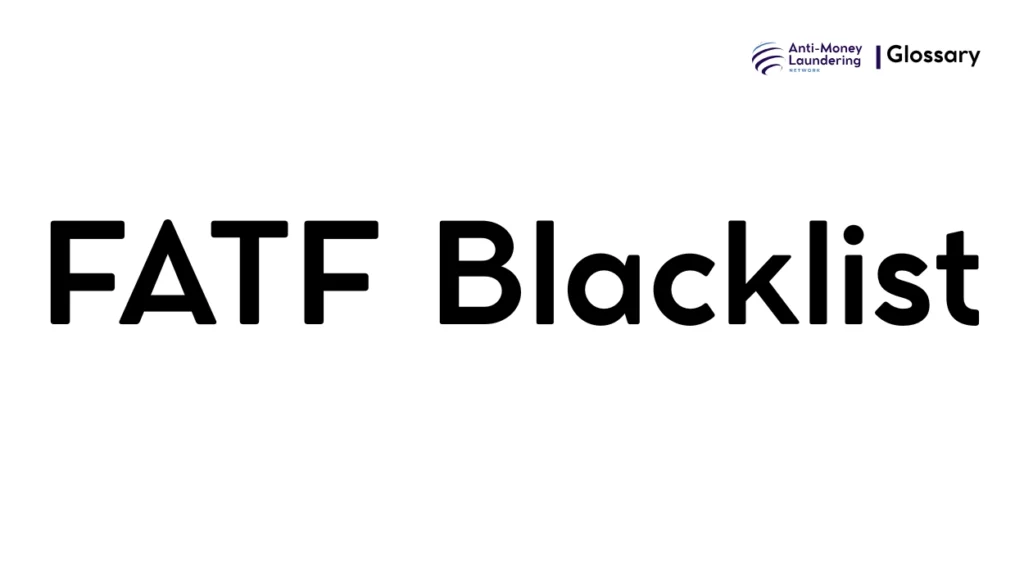Definition
The FATF Blacklist, formally known as the “List of High-Risk Jurisdictions Subject to a Call for Action,” is a list maintained by the Financial Action Task Force (FATF) that identifies countries with significant deficiencies in their anti-money laundering (AML) and counter-terrorist financing (CTF) frameworks. These countries have systems deemed severely inadequate to prevent financial crimes such as money laundering, terrorist financing, and proliferation financing, and critically, show little or no commitment to addressing these inefficiencies or aligning with FATF standards.
Purpose and Regulatory Basis
The primary role of the FATF Blacklist is to protect the integrity of the global financial system by spotlighting jurisdictions that pose a high risk due to inadequate AML/CTF controls. The blacklist serves as a regulatory benchmark, encouraging countries to improve their legal and operational frameworks to combat illicit financial activities. This is reinforced by key global and national regulations such as the FATF Recommendations themselves, the USA PATRIOT Act (which mandates enhanced scrutiny of transactions linked to high-risk countries), and the European Union’s Anti-Money Laundering Directives (AMLD), which reference FATF lists for enhanced due diligence.
When and How It Applies
The FATF Blacklist applies when a country’s AML/CTF regime fails FATF’s rigorous assessments of compliance with its 40 Recommendations and 11 Immediate Outcomes standards. Countries are assessed on both the technical implementation of laws and the effectiveness of enforcement. If deemed non-compliant and uncooperative, they are blacklisted. Financial institutions and compliance officers must then apply enhanced due diligence (EDD) in transactions involving these jurisdictions, often triggering increased scrutiny, transaction monitoring, and sometimes refusal of business to mitigate risks.
Types or Variants
FATF uses a three-tier system for country risk classification:
- Blacklist (High-Risk Jurisdictions Subject to a Call for Action): Countries with severe deficiencies and no serious remediation plans (e.g., North Korea, Iran, Myanmar).
- Greylist (Jurisdictions Under Increased Monitoring): Countries with strategic deficiencies but actively engaging with FATF to improve.
- Whitelist: Not official, but refers to countries fully compliant or working earnestly to maintain AML standards.
Procedures and Implementation
Financial institutions must integrate screening systems that automatically check customers and transactions against the FATF Blacklist. Upon identifying a match, institutions implement enhanced due diligence measures, including:
- Verifying the customer’s source of funds and wealth.
- Increased monitoring of transactions.
- Reporting suspicious activities to the relevant financial intelligence units.
- Potentially restricting or terminating business relationships.
Procedures must also include regular risk assessments, continuous monitoring of list updates (published three times yearly), and staff training aligned with regulatory expectations.
Impact on Customers/Clients
For customers linked to blacklisted countries, rights to financial services may be restricted or subjected to stringent verification and monitoring processes. These clients may face delays in transaction processing or outright denial of services to protect institutions from inadvertent involvement in illicit finance. This impacts cross-border trade and investment, where enhanced scrutiny can increase operational costs and compliance burdens for businesses operating in or with blacklisted jurisdictions.
Duration, Review, and Resolution
Inclusion on the FATF Blacklist is not permanent; it depends on a country’s progress in addressing AML/CTF shortcomings. Country reviews are conducted regularly, with a pathway for reclassification to the Greylist or full removal based on meeting FATF’s remediation deadlines and benchmarks. Continuous monitoring ensures countries maintain efforts to sustain compliance, and failure to improve can result in extended listing or reputational damage.
Reporting and Compliance Duties
Institutions must document all enhanced due diligence steps and decisions related to dealings with blacklisted countries. Failure to comply with FATF-related due diligence requirements can lead to severe regulatory penalties, reputational risk, and legal consequences. Reporting suspicious transactions linked to these jurisdictions is mandatory per regulations such as the USA PATRIOT Act and EU AMLD, ensuring authorities can take preventive or enforcement action.
Related AML Terms
The FATF Blacklist connects closely with other AML concepts such as:
- Enhanced Due Diligence (EDD): Additional scrutiny required for high-risk clients/countries.
- Sanctions Lists: While different, overlap exists; some blacklisted countries are also subject to international sanctions.
- Risk-Based Approach: FATF promotes tailored AML measures proportional to the identified risk levels.
- Greylist: The intermediary list showing countries under improvement plans.
Challenges and Best Practices
Challenges include inconsistent application of enhanced due diligence across institutions, evolving geopolitical influences on listing decisions, and risk of over-reliance on the list without robust internal controls. Best practices recommend:
- Timely list updates integration into compliance systems.
- Comprehensive training for staff.
- Coordination between AML, sanctions, and compliance teams.
- Proactive engagement with regulators on emerging risks.
Recent Developments
Recent trends include the adoption of advanced technology such as AI-powered screening tools and continuous transaction monitoring to improve compliance efficiency. Also, FATF has enhanced transparency and frequency of updates to its lists, reflecting the dynamic nature of global risks. Regulatory frameworks are increasingly emphasizing the integration of environmental, social, and governance (ESG) factors with AML compliance, impacting how risks related to jurisdictions are assessed.
The FATF Blacklist is a critical tool in global AML efforts, identifying countries that pose heightened risks for money laundering and terrorist financing due to inadequate controls and lack of cooperation. For compliance officers and financial institutions, understanding its implications and integrating proper controls is essential to protect the financial system and comply with international regulatory expectations. Its importance lies in driving global standards, transparency, and concerted efforts to mitigate financial crime risks.

